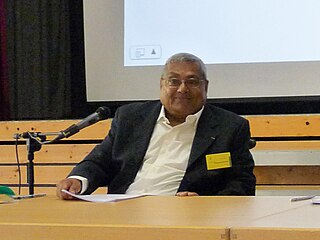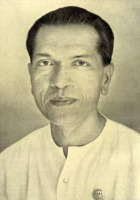
Integral yoga, sometimes also called supramental yoga, is the yoga-based philosophy and practice of Sri Aurobindo and The Mother. Central to Integral yoga is the idea that Spirit manifests itself in a process of involution, meanwhile forgetting its origins. The reverse process of evolution is driven toward a complete manifestation of spirit.
Kaikhosru Dhunjibhoy Sethna was an Indian poet, scholar, writer, philosopher, and cultural critic. He published more than 50 books. He was known by the diminutive Kekoo, but wrote his poetry under nom de plume of Amal Kiran.
Mother India is the Sri Aurobindo Ashram's originally fortnightly, now monthly, cultural review. It was started in 1948, the founding editor being K. D. Sethna, who continues as editor for over fifty years.
Pavitra was one of the very early disciples of Sri Aurobindo and The Mother. The name was one of Srimati Radharani's 1000 names.
Nirodbaran Chakravarty, known mononymously as Nirodbaran, or "Nirod" for short, was the closest disciple, personal physician and literary secretary to Sri Aurobindo and scribe for Savitri: A Legend and a Symbol and senior member of the Sri Aurobindo Ashram.

The Sri Aurobindo Ashram is a spiritual community (ashram) located in Pondicherry, in the Indian territory of Puducherry. The ashram grew out of a small community of disciples who had gathered around Sri Aurobindo after he retired from politics and settled in Pondicherry in 1910. On 24 November 1926, after a major spiritual realization, Sri Aurobindo withdrew from public view in order to continue his spiritual work. At this time he handed over the full responsibility for the inner and outer lives of the sadhaks and the ashram to his spiritual collaborator, "The Mother", earlier known as Mirra Alfassa. This date is therefore generally known as the founding-day of the ashram, though, as Sri Aurobindo himself wrote, it had "less been created than grown around him as its centre."
In Sri Aurobindo's philosophy, the Intermediate zone refers to a dangerous and misleading transitional spiritual state between the ordinary consciousness and true spiritual realisation.
Savitri: A Legend and a Symbol is the poetic main work of Sri Aurobindo, composed in nearly 24000 lines in blank verse. It is based on the legend of Savitri and Satyavan in the Mahabharata, which was given a symbolic significance by Sri Aurobindo. In his epic poem he deals with numerous spiritual subjects and describes deep transformative experiences of aspiring humans in their ascent towards a higher stage of evolution.
Indra Sen was a devotee of Sri Aurobindo and The Mother, psychologist, author, and educator, and the founder of Integral psychology as an academic discipline.

Prithwindra Mukherjee, who retired in 2003 from his career as a researcher in the Human and Social Sciences Department (Ethnomusicology) of the French National Centre of Scientific Research in Paris, is an author of a number of books and other publications on various subjects.
Record Of Yoga is Sri Aurobindo's personal record of his yogic practice during the period from 1909 to 1927. A difficult and often cryptic text, it has only recently been published.
The Advent is a quarterly magazine produced by the Sri Aurobindo Ashram, and is "Dedicated to the Exposition of Sri Aurobindo's Vision of the Future".
Sri Aurobindo Mandir Annual was first published in Calcutta in 1942. It was the first publication in which Savitri appeared in installments, in 1946 and 1947.
Sri Anirvan, born Narendra Chandra Dhar, was an Indian Hindu monk, writer and philosopher. Widely known as a scholar, his principal works were a Bengali translation of Sri Aurobindo's The Life Divine and the three-volume treatise Veda Mimamsa.

The Bande Mataram was an English language weekly newspaper published from Calcutta founded in 1905 by Bipin Chandra Pal and edited by Sri Aurobindo.

Mirra Alfassa, known to her followers as The Mother or La Mère, was a spiritual guru, occultist and yoga teacher, and a collaborator of Sri Aurobindo, who considered her to be of equal yogic stature to him and called her by the name "The Mother". She founded the Sri Aurobindo Ashram and established the town of Auroville; she was influential on the subject of Integral Yoga.

Sri Aurobindo was an Indian philosopher, yogi, maharishi, poet, and Indian nationalist. He was also a journalist, editing newspapers such as Vande Mataram. He joined the Indian movement for independence from British colonial rule, until 1910 was one of its influential leaders, and then became a spiritual reformer, introducing his visions on human progress and spiritual evolution.
Supermind, in Sri Aurobindo's philosophy of integral yoga, is the dynamic manifestation of the Absolute, and the intermediary between Spirit and the manifest world, which enables the transformation of common being into Divine being.

Tribhuvandas Purushottamdas Luhar, better known by his pen name Sundaram,, was a Gujarati poet and author from India.
Tara Jauhar is a writer and educationist from Delhi, India who has dedicated her life for disseminating the teachings of Sri Aurobindo who was an Indian philosopher, yoga guru, poet and nationalist who advocated a philosophy of life based on spiritual evolution. Tara Jauhar is the Chairman of the Sri Aurobindo Ashram, Delhi Branch which had been founded by her father Surendra Nath Jauhar in the year 1956. In the year 2022, Govt of India honored her with the Padma Shri award for her life long work dedicated to spreading the teachings of Sri Aurobindo.